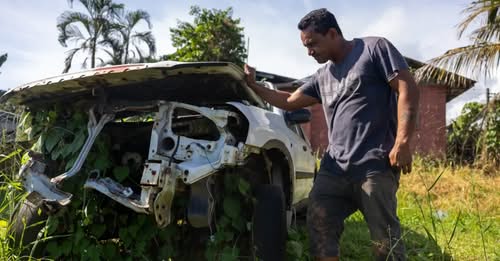The number of junk vehicles in Samoa’s ‘vehicle graveyards’ is growing posing an environmental concern with the absence of policies and laws to deal with the problem.
The Samoa Observer reports that there were almost 34,000 registered cars on the island. However, many of these vehicles have taken on a more permanent residence, sitting idle in front yards and tucked away among banana trees, raising concerns about what happens when they eventually become unfit for the roads.
Old used cars are a common sight in Samoa, often overgrown with tall grass, yet the question remains: Where will these cars go when they are written off and need to be discarded?
“Clearly, dumping them in yards or on wasteland is not recommended because they contain harmful materials and are unsightly,” warned James Atherton, environmentalist and President of the Samoa Conservation Society.
“Dumping is only the surface level of the problem; the cars that still have their batteries installed cause even more harm to the environment. Cadmium, lead, and sulphuric acid are all toxic to humans and other life forms.”
Old batteries, a common fixture in these abandoned vehicles, must be properly disposed of to mitigate their environmental impact.
“So old batteries need to be disposed of properly at the landfill—Tafaigata and Vaiaata,” Atherton advised.
He also noted, “Old engines can leak oil, so they should probably be emptied of oil if possible.”
Meanwhile, the rising number of outdated vehicles poses a significant problem. “This is a huge problem in Samoa that will get worse as more and more cars are imported,” said Atherton.
The Samoa Conservation Society’s concerns echo a global issue. Abandoned vehicles around the world are becoming environmental hazards. The presence of toxic materials in neglected cars clutters landscapes and poses risks to humans and wildlife, prompting cities worldwide to look for effective policies and solutions to manage this growing problem.
The Samoa Observer is currently awaiting comments from the Ministry of Natural Resources and Environment (MNRE) regarding the policies in place for the disposal of these abandoned cars.
Addressing the issue of their sustainable disposal will be crucial for preserving Samoa’s natural beauty and ensuring public safety.
